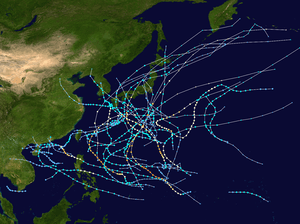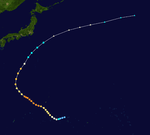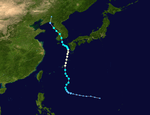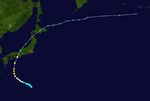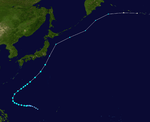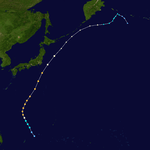1950 Pacific typhoon season
1950 Pacific typhoon season
| |
| Season summary map |
| First system formed |
April 12, 1950 |
| Last system dissipated |
January 1, 1951 |
| Strongest storm1 |
Super Typhoon Doris – |
| Total storms |
18 |
| Typhoons |
12 |
| Super typhoons |
1 |
| Total fatalities |
Unknown |
| Total damage |
Unknown |
| 1Strongest storm is determined by lowest pressure |
Pacific typhoon seasons
1948, 1949, 1950, 1951, 1952 |
The 1950 Pacific typhoon season has no official bounds; it ran year-round in 1950, but most tropical cyclones tend to form in the northwestern Pacific Ocean between June and December. These dates conventionally delimit the period of each year when most tropical cyclones form in the northwestern Pacific Ocean.
The scope of this article is limited to the Pacific Ocean, north of the equator and west of the international date line. Storms that form east of the date line and north of the equator are called hurricanes; see 1950 Pacific hurricane season. Tropical Storms formed in the entire west pacific basin were assigned a name by the North Pacific Typhoon Warning Service.
Storms
Severe Tropical Storm 01W
| Severe tropical storm (CMA) |
| Tropical storm (SSHWS) |
|
|
| Duration |
April 12 – April 15 |
| Peak intensity |
110 km/h (70 mph) (10-min) 984 hPa (mbar) |
Super Typhoon Doris
| Category 4 super typhoon (SSHWS) |
|
|
| Duration |
May 6 – May 14 |
| Peak intensity |
240 km/h (150 mph) (1-min) 928 hPa (mbar) |
Tropical Storm 02W
| Tropical storm (SSHWS) |
|
|
| Duration |
June 5 – June 9 |
| Peak intensity |
65 km/h (40 mph) (1-min) 997 hPa (mbar) |
Typhoon Elsie
| Category 1 typhoon (SSHWS) |
|
|
| Duration |
June 23 – June 24 |
| Peak intensity |
140 km/h (85 mph) (1-min) 981 hPa (mbar) |
CMA Severe Tropical Storm 6
| Severe tropical storm (CMA) |
| Tropical storm (SSHWS) |
|
|
| Duration |
July 12 – July 15 |
| Peak intensity |
95 km/h (60 mph) (10-min) 990 hPa (mbar) |
Tropical Storm Flossie
| Tropical storm (SSHWS) |
|
|
| Duration |
July 15 – July 19 |
| Peak intensity |
110 km/h (70 mph) (1-min) 993 hPa (mbar) |
Typhoon Grace
| Category 1 typhoon (SSHWS) |
|
|
| Duration |
July 16 – July 21 |
| Peak intensity |
130 km/h (80 mph) (1-min) 981 hPa (mbar) |
Tropical Storm Helene
| Tropical storm (SSHWS) |
|
|
| Duration |
July 24 – August 3 |
| Peak intensity |
95 km/h (60 mph) (1-min) 991 hPa (mbar) |
Tropical Storm 13W
| Tropical storm (CMA) |
| Tropical storm (SSHWS) |
|
|
| Duration |
August 2 – August 4 |
| Peak intensity |
75 km/h (45 mph) (10-min) 992 hPa (mbar) |
Tropical Storm 15W
| Tropical storm (CMA) |
| Tropical depression (SSHWS) |
|
|
| Duration |
August 3 – August 4 |
| Peak intensity |
75 km/h (45 mph) (10-min) 998 hPa (mbar) |
Tropical Storm 16W
| Tropical storm (CMA) |
| Tropical storm (SSHWS) |
|
|
| Duration |
August 4 – August 6 |
| Peak intensity |
75 km/h (45 mph) (10-min) 996 hPa (mbar) |
Typhoon Ida
| Category 1 typhoon (SSHWS) |
|
|
| Duration |
August 9 – August 21 |
| Peak intensity |
140 km/h (85 mph) (1-min) 973 hPa (mbar) |
Severe Tropical Storm 20W
| Severe tropical storm (CMA) |
| Tropical depression (SSHWS) |
|
|
| Duration |
August 10 – August 14 |
| Peak intensity |
95 km/h (60 mph) (10-min) 990 hPa (mbar) |
Severe Tropical Storm Twenty one
| Tropical storm (SSHWS) |
|
|
| Duration |
August 11 – August 14 |
| Peak intensity |
110 km/h (70 mph) (1-min) 980 hPa (mbar) |
Severe Tropical Storm 23W
| Severe tropical storm (CMA) |
| Tropical storm (SSHWS) |
|
|
| Duration |
August 14 – August 22 |
| Peak intensity |
110 km/h (70 mph) (10-min) 990 hPa (mbar) |
Typhoon Jane
| Category 3 typhoon (SSHWS) |
|
|
| Duration |
August 29 – September 4 |
| Peak intensity |
185 km/h (115 mph) (1-min) 943 hPa (mbar) |
Typhoon Jane struck the island of Shikoku in Japan on the 3rd of September. Resulting flooding and landslides killed 539 people.
In late August, a depression formed and quickly intensified into a tropical storm and was given the name Jane. The storm drifted west-northwestward and intensified into a typhoon. Jane gradually curved to the north and intensified to a category 2 typhoon. Jane shortly reached category 3 status and peak intensity at 185 kph (115 mph). The typhoon accelerated to the north-northeast and weakened to a category 2 storm and made landfall in the modern-day Osaka-Kobe-Kyoto area. Jane crossed Kyoto Prefecture and weakened to a tropical storm and crossed the Noto Peninsula and reentered the Sea of Japan and passed just west of Sado Island. The storm struck eastern Aomori Prefecture and crossed the Tsugaru Straits and made a final landfall on the south coast of Hokkaido Prefecture. Jane crossed Hokkaido and dissipated south of the Kuril Islands.
Typhoon Kezia
| Category 3 typhoon (SSHWS) |
|
|
| Duration |
September 4 – September 15 |
| Peak intensity |
185 km/h (115 mph) (1-min) 945 hPa (mbar) |
On September 13 Typhoon Kezia hit part of the fleet off Kyushu.
P-51 Mustangs belonging to No. 77 Squadron RAAF were grounded at Iwakuni because of the typhoon on September 13 and 14.[1]
Severe Tropical Storm 26W
| Severe tropical storm (CMA) |
| Tropical storm (SSHWS) |
|
|
| Duration |
September 6 – September 8 |
| Peak intensity |
95 km/h (60 mph) (10-min) 995 hPa (mbar) |
Tropical Storm Lucretia
| Tropical storm (SSHWS) |
|
|
| Duration |
September 14 – September 19 |
| Peak intensity |
100 km/h (65 mph) (1-min) 987 hPa (mbar) |
Tropical Storm Missatha
| Tropical storm (SSHWS) |
|
|
| Duration |
September 13 – September 19 |
| Peak intensity |
100 km/h (65 mph) (1-min) 984 hPa (mbar) |
Typhoon Ossia
| Category 3 typhoon (SSHWS) |
|
|
| Duration |
September 27 – October 6 |
| Peak intensity |
185 km/h (115 mph) (1-min) 966 hPa (mbar) |
Typhoon Petie
| Category 2 typhoon (SSHWS) |
|
|
| Duration |
October 18 – October 24 |
| Peak intensity |
165 km/h (105 mph) (1-min) 978 hPa (mbar) |
Severe Tropical Storm 25W
| Severe tropical storm (CMA) |
| Tropical storm (SSHWS) |
|
|
| Duration |
October 26 – October 31 |
| Peak intensity |
95 km/h (60 mph) (10-min) 995 hPa (mbar) |
Typhoon Ruby
| Category 3 typhoon (SSHWS) |
|
|
| Duration |
October 27 – October 31 |
| Peak intensity |
185 km/h (115 mph) (1-min) 918 hPa (mbar) |
Typhoon Billie
| Category 1 typhoon (SSHWS) |
|
|
| Duration |
November 4 – November 9 |
| Peak intensity |
150 km/h (90 mph) (1-min) 985 hPa (mbar) |
Typhoon Clara
| Category 4 typhoon (SSHWS) |
|
|
| Duration |
November 4 – November 13 |
| Peak intensity |
230 km/h (145 mph) (1-min) 899 hPa (mbar) |
Tropical Storm Delilah
| Tropical storm (SSHWS) |
|
|
| Duration |
November 19 – November 25 |
| Peak intensity |
110 km/h (70 mph) (1-min) 989 hPa (mbar) |
Severe Tropical Storm Ellen
| Tropical storm (SSHWS) |
|
|
| Duration |
December 11 – December 13 |
| Peak intensity |
105 km/h (65 mph) (1-min) 990 hPa (mbar) |
Typhoon Fran
| Category 1 typhoon (SSHWS) |
|
|
| Duration |
December 26 – January 1 |
| Peak intensity |
150 km/h (90 mph) (1-min) 980 hPa (mbar) |
Typhoon Fran was a late season storm that struck the northern Philippines killing 5 people.[2]
1950 storm names
The names Delilah, Helene, Jane, Kezia, Lucretia, Missatha, Ossia, and Petie were retired after this year and replaced with Dot, Helen, June, Kathy, Lorna, Marie, Olga, and Pamela.
- Doris
- Elsie
- Flossie
- Grace
- Helene
- Ida
- Jane
- Kezia
- Lucretia
- Missatha
|
- Nancy
- Ossia
- Petie
- Ruby
- Anita
- Billie
- Clara
- Delilah
- Ellen
- Fran
|
See also
References
- ↑ "RAAF Form A.50 - No. 77 Squadron, RAAF - September 1950". AviationHeritage.org. Retrieved 28 June 2016.
- ↑ Pagasa - Dost - Dost Service Institutes
External links
